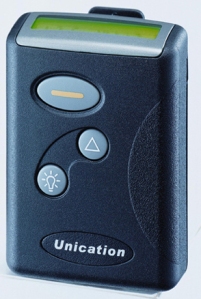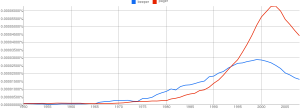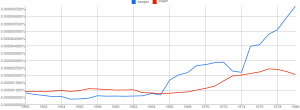
Today’s post is a quick example of the kind of language-culture connection that can be made by using the Google ngram tool I mentioned in the last post. It features some wildly unsupported hypothesizing, but sometimes that’s the way we do things here.1
It had actually occurred to me years ago that there had been a shift in the use of the terms pager and beeper (to refer to the portable electronic paging device). This observation was based completely on subjective impression. It seemed to me that the word beeper used to be more common, an impression I formed from things like television and film, but that the word pager to refer to the same device was becoming increasingly common. I attributed this to the increasing use of the devices by the general public, not just those in special niches, such as doctors or plumbers. The word beeper calls attention to external impression of the devices -- they make beeping noises. The word pager calls attention to the function of the devices. Of course in the years since, the devices themselves have largely disappeared with the advent of the cell phone.
Now with the ngram tool (and a little background research) I can test this observation. Pagers were invented in 1950 (as you can read about in the Wikipedia entry). The devices were not initially referred to as beepers or pagers. As you can read in this early Popular Science article, the service is referred to as a radio paging service and the unit itself is referred to as a pocket ratio or portable receiver. As it turns out, the words pager and beeper both predate the device which they have come to refer to. The OED lists the first attestation of the word beeper in 1946 to refer to any machine which makes a beeping sound. According to Merriam-Webster, the first use of the word with its current more restricted use is 1970. The word pager was originally a printing term, referring to someone who makes up type into pages (dating from the 19th century). The first use of the word to refer to the radio device is not until 1968.
Now these other senses of the words beeper and pager may cause some ‘noise’ in the Google ngram search results, particularly in the earlier years before the current uses become more common, but these other uses are rather uncommon and are soon drowned out. In any case, some general trends are quite clear.


Initially beeper has the edge on pager. Then in the early 1990s, as the devices become more commonplace, the word pager surges ahead, and beeper starts to level off and eventually decline. Of course both words drop off dramatically in the early 21st century as the devices themselves become uncommon. So now, thanks to the Google ngram tool, I’ve easily been able to support this casual supposition I’ve been making all these years. It’s a fun game to play. If anyone reading this wishes to play around with the ngram tool, I’d love to hear about your results in the comments.
1 It’s my blog and I can do what I like! Obviously one could do a little more digging and consider things like regional variation, other terms beyond the two I consider here, and other influencing factors, but this is just a quick example. Do also have a look at the Culturomics website, and in particular the Cultural Observatory for more details about this kind of analysis. Also, have a listen to this podcast from Lexicon Valley about the analysis of the language used in such historically-set tv shows as Downton Abbey and Mad Men. [back]
